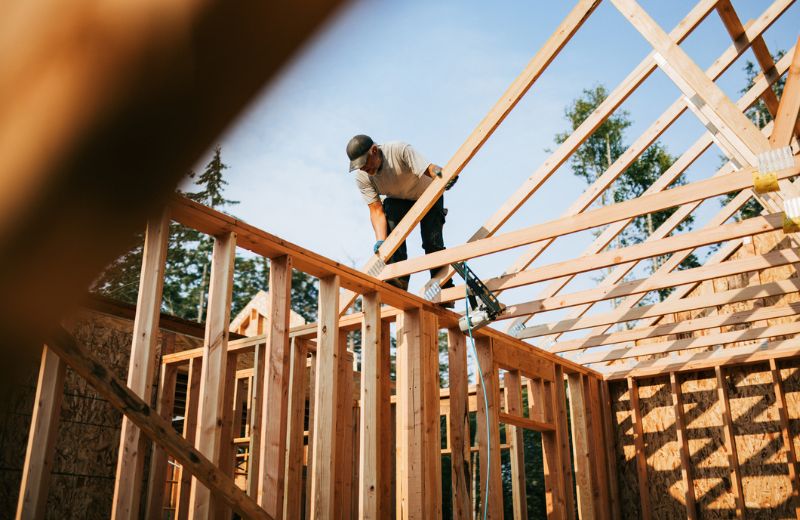not featured
2025-06-06
6/6/2025
Mortgage
published
%20(43).jpg)
Construction Loans: Building Your House from the Ground Up
Have you always dreamed of building a brand-new home, designed just the way you want and need? Or perhaps new construction is appealing in the context of historically low housing inventory. Whatever the reason, Northwest Arkansas and Southwest Missouri offer many lovely areas to build a new home for your primary residence or vacation home. In this article, we’ll take a closer look at construction loans, which are usually the best option for financing the construction of your dream home in Northwest Arkansas and Southwest Missouri.
A construction loan is a type of short-term financing to cover the costs of building your new home. Instead of receiving a lump sum upfront, your contractor submits proof of progress and draws funds from the construction loan at each stage of the process.
Because construction loans are short-term, typically designed to last no more than a year, you can make interest-only payments on the construction line of credit until your new home is move-in ready. With a certificate of occupancy, you can conveniently convert your construction loan balance to a 30, 20, or 15-year conventional mortgage.
- Single Close: A construction-to-permanent loan offers the convenience and savings of having only one closing.*
- Construction Only: This type of loan just covers expenses associated with the construction process It must be paid off when the loan is complete. A good option for people who can pay off their construction loan by selling their existing home.
- Refinance Construction loan to Permanent Financing: This type of loan refinances the construction loan into a residential mortgage loan with either a long-term fixed rate mortgage or an adjustable rate mortgage. There will be some additional closing costs incurred to convert the loan.
Funds are distributed to your contractor as major milestones are completed such as:
- The construction site is prepared, and the foundation poured.
- Rough framing is completed.
- Electricity and HVAC are installed.
- Insulation is put in.
- Drywall and interior fixtures are completed.
- Exterior finishes, walkways, and driveway are completed.
- Hard surface flooring and countertops are installed.
- Exterior grading is completed and mechanical trims are finished.
- Bathroom fixtures, mirrors, and shower doors are installed.
Funds from your construction loan can be used for just about any related expense, including:
- The Land – if not already acquired and paid for.
- Permits
- Contractor Labor
- Building materials
- Appliances
It’s important to note that furniture and other decor purchases are not appropriate uses of your construction loan. Construction loans are just for the permanent features of the home as well as the appliances that make it functional.
Construction projects are notorious for going over budget. However, you can have some control over this with the choices you make during the home building process.
- Floor Plans: It’s usually cheaper to select a floor plan from your builder than to have a custom plan drawn up. The bigger your floor plan, the higher the cost of building your home.
- Style: Standard interior design and architectural features are less expensive than unique flourishes that may be costlier for your contractor to create.
- Construction Costs: Get estimates from more than one builder before signing a contract. Keep in mind that those estimates reflect basic construction costs and don’t include the materials and finishes you choose for your home’s interior.
- Site Preparation: A lot in a planned community will probably be ready to go, whereas a stand-alone parcel of land may need to have trees, rocks, and other things cleared away before construction can begin. It may also require a well and septic to be put in as well as paying for utilities to be run to the property.
- Permit Fees: This will depend on your town or municipality.
- Labor and Material Costs: These can fluctuate dramatically depending on supply chain issues and conditions in the broader economy.
When you find the perfect piece of land or new community to build in, the next step is to apply for a construction loan. Here’s what you can expect:
- Get quotes from reputable builders.
- Choose a builder and draw up a contract.
- Send the signed contract to your lender for underwriting. Detailed building plans and budget information may also be required.
- Your project proposal will be reviewed for approval for both construction and permanent mortgage financing (if you’re doing a single close construction loan).
- When your loan is approved, a closing date will be set.
- Congrats–you closed on your loan and can now begin the construction process.
The requirements for getting a construction loan approved are similar to most mortgage loans.
- Good Credit Score
- Down Payment
- Qualified contractor approved by your lender
A construction loan is not intended for home renovations. Instead, you can use your equity to pay for renovations with a Home Equity Loan, Home Equity Line of Credit, or Cash out Mortgage Refinance. If you don’t have enough equity to pursue these options, a personal home improvement loan or personal line of credit could also be used.
If you’re interested in buying farmland to start a farm, it’s best to work with an experienced ag lender and pursue an Ag Real Estate Loan instead of a home construction loan.
If you're looking for a construction mortgage lender in Harrison, Berryville, Huntsville, Eureka Springs, Holiday Island, Arkansas, or Cassville, Missouri, our mortgage lenders are here to help. CS Home Mortgage is CS Bank’s full-service mortgage department serving homebuyers in Northwest AR and Southwest MO. After more than a century of mortgage lending, we’ve taken all we’ve learned to provide you with the information and tools you need to purchase your first home.
*CS Bank no longer handles Single Close Construction Loans.


